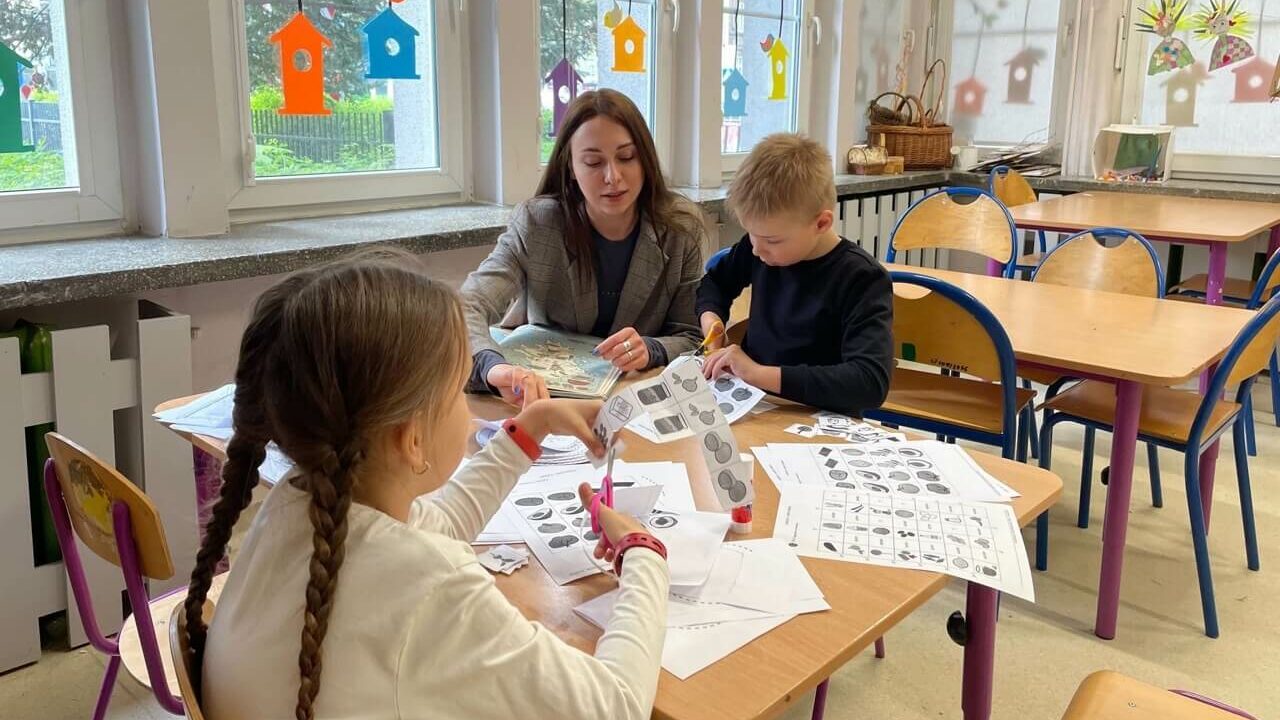In response to the needs of children with refugee background, Foundation Ukraine has launched a long-term support program for the adaptation and education of Ukrainian pupils in Polish schools. Foundation Ukraine employs 39 intercultural assistants in approximately 30 schools in Lower Silesia. Schools in Wrocław, Świdnica, Legnica, Wałbrzych, Jelcz-Laskowice, Bielawa are covered by the care of the assistants.
The main goal of intercultural assistants is to support children and their parents at all stages of adaptation in Polish educational institutions.

Performing duties in designated schools in Wrocław and providing support involves, in particular:
- Supporting students in the process of cultural adaptation by explaining values and behavior norms in Polish schools.
- Providing information to teachers regarding important aspects of culture and/or religion that impact the student’s behavior and participation in school life, such as trips and school performances.
- Helping with homework by translating instructions into the student’s native language or Polish in an understandable way.
- Participating in school lessons to support the student in learning, including translating teacher’s instructions and textbook instructions into the student’s native language or Polish in a way understandable to the student.
- Activating migrant students through activities that utilize their national and cultural heritage, such as conducting interest groups, language circles, etc.
- Co-organizing events related to the religion and culture of the students’ home country (e.g., multicultural day).
- Conducting activities that integrate children from Poland and other countries, e.g., during homeroom.
- Actively helping to resolve ongoing conflicts between the students, especially conflicts arising from cultural differences.
- Mediating between the school and parents/guardians.
- Serving as a translator at school meetings for parents and guardians.
- Assisting parents or guardians in completing necessary school formalities.
- Assisting during the enrolment of a student with migration experience who does not speak Polish.
Intercultural assistants help children with a refugee background to better integrate into school life, adapt to a new society, and master Polish language. By providing language support to foreign students and their families, they give teachers information about their culture and help them understand cultural differences, resolve conflicts in a multicultural school environment, and shape an attitude of respect for social diversity in the school.
Despite this, the work of assistants is multidirectional. On a daily basis, they also help Polish students and parents feel safe, build trust and tolerance towards foreigners, fight against prejudices and nationality, ethnic, and religious stereotypes, and promote the idea of multiculturalism.
Check Foundation Ukraine’s video about the role of intercultural assistants and their impact on the integration of children into the Polish education system. Pleasant viewing!
Video has been created as a part of the Refugee Children Support Ecosystem project financed by Save the Children International.
Q&A Support for Students in Polish Schools
Is my child entitled to assistance from a teacher, commonly referred to as an intercultural assistant?
Yes, if your child is not a Polish citizen, is subject to compulsory schooling or education, and does not know Polish or knows it at a level insufficient to benefit from education, they are entitled to teacher assistance. This right is written down in Article 165, point 8 of the Education Law. Additionally, point 8a introduces the possibility of hiring an intercultural assistant. Starting from the 2024/25 school year, these are two separate positions.
What do I need to do to get teacher assistance assigned to my child?
You just need to submit the appropriate application to the school principal. You can find it on our website.
How long can my child benefit from teacher assistance?
This assistance is provided for no longer than 12 months. The 12-month period is counted from the issuance of the decision/granting of teacher assistance for the child. However, this should be treated rationally; that is, teacher assistance is for children who have recently arrived in Poland (a child who has been studying in a Polish school for 3 years and then wants to receive teacher assistance is unfortunately not entitled to it).
My child speaks Polish poorly. Is there a chance for free additional Polish language classes?
Yes, if your child is not a Polish citizen, is subject to compulsory schooling or education, and does not know Polish or knows it at a level insufficient to benefit from education, they are entitled to additional, free Polish language classes for no longer than 24 months. Additional Polish language classes for these individuals are organized by the school’s managing authority. The additional Polish language classes are provided as follows:
- A minimum of 2 hours if you arrived before the war or the children are of non-Ukrainian nationality.
- A minimum of 6 hours if the children are Ukrainian citizens and you arrived due to the Russian invasion of Ukraine (i.e., after February 2022).
It should be noted that whether a child needs additional Polish language instruction is determined by the teacher/principal (who sees that the child does not speak/understand Polish). Of course, parents can submit a request, but the initiative should come from the teacher/principal, who should officially refer the child in need to additional Polish classes.
Can my child participate in a preparatory class at school?
Can my child participate in remedial classes for other subjects, such as mathematics?
Yes, if the teacher of a particular subject determines the need to fill in curriculum gaps in that subject, the principal should organize additional remedial classes in that subject. These additional remedial classes are conducted individually or in groups, in the form of extra lessons in that subject, for 1 lesson hour per week. It should be pointed out that the total number of lesson hours cannot exceed 5 hours per week for one student.

